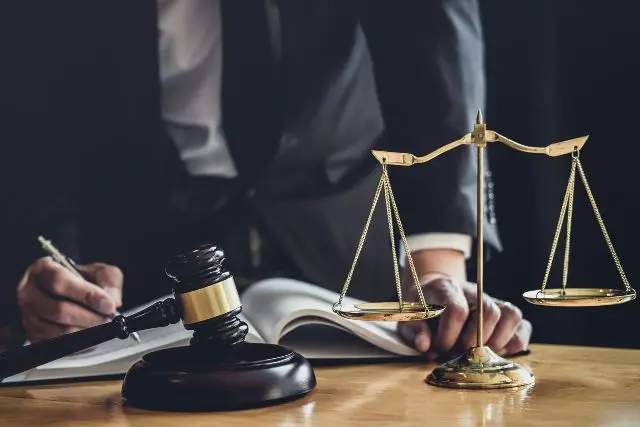Trusted tort law attorney
Learn about tort law cases in Atlanta and how CONOSCIENTI & LEDBETTER Attorneys at Law can provide legal representation for your case.
 Author: J. Blake Ledbetter, Partner, Conoscienti & Ledbetter
Author: J. Blake Ledbetter, Partner, Conoscienti & Ledbetter
Mr. Ledbetter specializes in civil litigation in metropolitan Atlanta, Georgia, and possesses vast experience in wrongful death lawsuits. Mr. Ledbetter was recognized as a SuperLawyers Rising Star in 2018 and 2019 in the area of Civil Litigation. Published on March 30, 2024.

Speak with experienced tort law attorney today, for free.
Tort law is an area of civil law that deals with wrongful acts committed by one party against another, causing injury or harm. There are three primary types of torts: intentional torts (actions knowingly committed with the intent to cause harm), negligence (failure to exercise a reasonable standard of care, resulting in harm), and strict liability (in which the act itself is inherently dangerous or harmful, regardless of the intent or level of care taken).
In Atlanta, the principles of tort law are often guided by Georgia state legislation and common law. As in most states, victims of tortious conduct can seek redress through the court systems in the form of compensatory damages, which are awarded to help the injured party recover from the harm caused by the defendant’s action or occasionally, in the case of particularly reprehensible conduct, punitive damages.
We, as experienced tort law attorneys in Atlanta, are well-versed in navigating the complexities of numerous tort law cases. From personal injury to property damage claims, we aim to provide clients with the best possible representation and outcomes tailored to their individual needs and circumstances. Our in-depth knowledge of the Atlanta legal landscape allows us to guide clients through the process with confidence, clarity, and a strong understanding of the law.
Common Types of Tort Cases
In this section, we will discuss three common types of tort cases: personal injury, product liability, and negligence. We’ll provide an overview of each and important aspects to consider within each category.
Personal Injury
Personal injury torts involve individuals who suffer physical, emotional, or financial harm due to someone else’s actions. Typical examples include car accidents, slips and falls, and medical malpractice. In these cases, the victim may seek compensation for their injuries, lost wages, and more.
To pursue a personal injury claim, the injured party generally must prove that the defendant’s conduct was the direct cause of their injury. Additionally, it’s essential to establish that the defendant owed a duty of care to the victim and that this duty was breached.
Product Liability
Product liability torts relate to injuries or damages caused by defective products. Manufacturers, distributors, and retailers have a responsibility to ensure that their products are safe for use. When they fail to do so, and a consumer is harmed, they may be held liable.
To succeed in a product liability claim, the plaintiff must demonstrate that the product in question was defective and that the defect directly led to their injury. Types of defects may include poor design, improper manufacturing, or a failure to provide adequate warnings or instructions.
Negligence
Negligence torts involve actions or inaction that result in harm to another person. Four key elements must be proven for a successful negligence claim: duty, breach of duty, causation, and damages. The defendant must owe a duty of care to the plaintiff, breach this duty, and such a breach must directly result in harm.
It’s important to note the distinctions between comparative and contributory negligence. Comparative negligence divides liability proportionally based on each party’s level of fault, whereas contributory negligence bars a plaintiff from recovering any damages if they are found to be even partially at fault.
As tort law attorneys in Atlanta, we are well-versed in handling these types of cases and helping victims seek the compensation they deserve. Whether it’s a personal injury, product liability, or negligence claim, our expertise in tort law ensures that our clients receive knowledgeable, clear, and effective legal representation.

Speak with trusted tort law attorney today, for free.
Legal Process for Tort Law Cases
Step-by-step Guide to Filing a Tort Law Case
- Identify the Legal Issue: The first step is to determine the basis of the claim. This may include negligence, intentional torts, or strict liability torts.
- Consult a Tort Law Attorney: It’s crucial to consult with a skilled civil lawyer in Atlanta GA to assess the viability of the case and provide guidance on the best course of action.
- File the Complaint: The attorney drafts and files a complaint with the appropriate court, outlining the plaintiff’s claims and the alleged harm suffered.
- Discovery Phase: Both parties involved gather evidence to build their case. This may involve document requests, written interrogatories, or depositions.
- Negotiations and Settlement: It’s common for tort law cases to be settled out of court through negotiations. Mediation may also be used to reach a mutual agreement.
- Trial: If negotiations fail, the case proceeds to trial, where both parties present their arguments in front of a judge or jury to determine liability and appropriate compensation.
Role of Attorneys, Courts, and Experts in Tort Law Litigation
A tort law attorney plays a pivotal role in navigating the legal process. Their expertise aids in efficiently building a strong case, negotiating settlements, and representing their clients during trial proceedings. Tort law attorneys also provide guidance on the appropriate steps to take and the potential value of the claim, such as possible damages and likelihood of a favorable outcome.
The court system serves as the venue where these cases are tried and resolved. Judges or juries are responsible for determining the outcome of tort law cases, assessing the presented evidence, and determining liability, as well as the rightful amount of compensation to be awarded to the plaintiff.
Experts are frequently involved in tort law cases. Depending on the specifics of the case, experts may be called upon to provide testimony or prepare reports to assess the extent of harm, evaluate the defendant’s conduct, or give a professional opinion on industry standards. Examples of experts include medical professionals, engineers, or financial analysts, each contributing their expertise to strengthen the case.
Navigating the legal process of a tort law case in Atlanta involves several critical steps and the participation of attorneys, courts, and experts. By understanding these processes and the crucial roles players involved, we can better appreciate the complexities of tort law litigation and its significance in protecting individuals from harm.
How CONOSCIENTI & LEDBETTER Attorneys at Law Can Help with Tort Law Cases
When faced with a tort law case, you need a law firm that is well-versed in the intricacies of this area. At CONOSCIENTI & LEDBETTER, we have a history of successfully handling tort law cases, ensuring that our clients receive top-quality representation.
Our legal team offers an array of services to cater to the distinct needs of clients with various tort law claims. We provide invaluable guidance and counsel at each stage of the legal process, whether negotiating settlements or fighting for our clients in court.
As award-winning Atlanta lawyers, we take pride in our dedication to comprehensively understanding every detail of your case. Using this knowledge, we develop strategies tailored to your unique situation and aimed at achieving the best possible outcome.
In addition to our experience and skills, we maintain a customer-centric approach, prioritizing your safety and comfort as we navigate the legal complexities surrounding tort law. We always strive to communicate in a clear and transparent manner, ensuring you are informed and confident throughout the entire process.
We are committed to providing the highest level of representation for those facing tort law challenges. Trust in our expertise and let us help you secure the justice you deserve.

Don’t delay. Schedule a risk-free consultation today.
Compensation and Damages in Tort Law Cases
In tort law cases, the primary goal of the legal process is to compensate the victim for the harm or loss suffered. This involves determining the appropriate monetary value to be awarded to the victim. In this section, we will discuss the types of compensation available for victims of torts and the various factors that courts consider in calculating these awards.
One of the most common forms of compensation in tort law is compensatory damages. These are intended to restore the victim to the position they were in before the tort occurred. Compensatory damages can be divided into two categories: pecuniary (financial) and non-pecuniary (non-financial).
Pecuniary damages include losses such as:
- Medical expenses
- Lost wages
- Repair or replacement costs for property damage
- Loss of future earning capacity
Non-pecuniary damages, on the other hand, compensate victims for non-financial losses. These may encompass:
- Pain and suffering
- Emotional distress
- Loss of enjoyment of life
- Loss of consortium or companionship
In some cases, courts may also award punitive damages. It is crucial to note that the goal of punitive damages is not to compensate the victim but to punish the wrongdoer. Punitive damages are typically awarded in cases of particularly egregious conduct or when the defendant acted with malice or reckless disregard for the rights of others.
When calculating compensation and damages, courts consider various factors such as the severity and extent of the harm, the victim’s personal circumstances, and the wrongdoing party’s degree of culpability. There is no one-size-fits-all approach, and each case is evaluated on its unique set of facts.
In conclusion, it’s important to understand the various types of compensation and damages available in tort law cases. By seeking legal assistance from a knowledgeable tort law attorney, victims can navigate the complex legal landscape and pursue the compensation they are entitled to for their suffering and loss.
Decatur Office
(404) 373-5800
315 W Ponce de Leon Ave. Suite 400 Decatur, GA 30030





